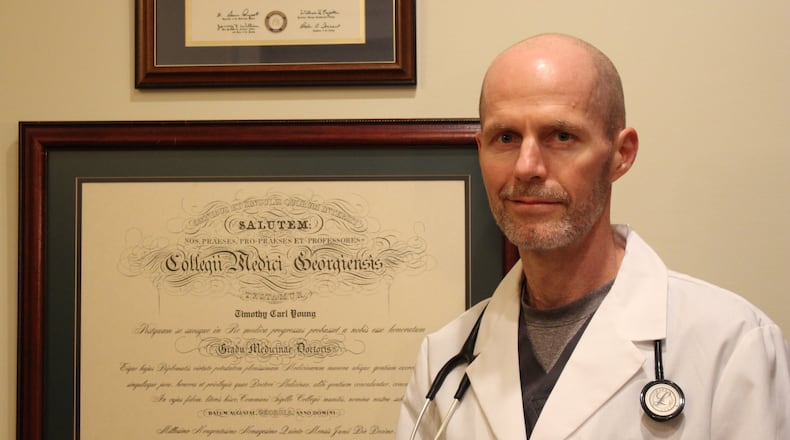Dr. Timothy Young repeatedly alerted state officials about unsafe and unsanitary conditions at Georgia’s flagship prison medical facility. Outside an operating room, he told them, water leaked from ceilings, leading to black mold, and trash was allowed to pile up. Inside the OR, during surgery doctors and nurses had to deal with insects attracted by the debris.
Among other concerns, Young, the director of the prison’s outpatient clinic, also was alarmed at security not being provided for medical staff when treating inmates who could pose a threat, and at delays in getting inmates’ essential care.
Yet the problems at Augusta State Medical Prison persisted, so Young began leaking information about the conditions to The Atlanta Journal-Constitution.
After an AJC investigation detailed the conditions in 2017, Young said that the warden, suspecting he tipped the newspaper, refused to take his phone calls, and he was told by medical officials not to put any more complaints in writing. Young also alleged that inmate care suffered. Concerned that he would be fired, Young resigned in January 2018, ending his16-year career at the prison.
Now, the state is settling a lawsuit Young filed alleging that he was the victim of retaliation for blowing the whistle about the problems. The state will pay $300,000 on behalf of defendants Georgia Correctional HealthCare, which provides medical care at the prison; its statewide medical director, Dr. Billy Nichols; and ASMP Warden Ted Philbin.
Young, who now works as clinical director of health services at a federal prison in South Carolina, said the money was not the point of his lawsuit. His overriding goal, he said, was to trigger a state investigation of Georgia Correctional HealthCare and the Department of Corrections and hold them accountable.
“Both were responsible for the inmates’ deaths and suffering,” he said.
However, he said that in the settlement, the defendants denied any responsibility for wrongdoing.
The Georgia Attorney General’s Office, which represented defendants in the case, declined comment.
Georgia Correctional HealthCare is a branch of Augusta University. Christen Engle, the university’s vice president of communications and marketing, declined to comment.
The state had tried to get the lawsuit decided in its favor last year without going to trial, arguing that Nichols and Philbin were entitled to qualified immunity from the lawsuit as state employees. They also argued that Young wasn’t protected by free speech rights when he secretly provided information to the AJC.
In a November 2019 deposition, Nichols testified that Young had been alerting him to problems at ASMP for years. In 2012, when Nichols was medical director at the prison, Young had talked with him about the mold problem, and Nichols said he became aware of asbestos issues eight years ago.
Security issues, he said, were the responsibility of the warden, and Nichols testified that he didn’t know that Young had lost direct access to the warden until he heard Young’s testimony.
Nichols also testified that it was “ethically inappropriate” for him to have told Young not to send his concerns about conditions in writing. “I should not have prevented him from communication with me by email,” Nichols said.
Nichols also said that he had been trying to fill Young’s position since he resigned nearly two years earlier and was unable to find another physician for the job.
Engel, with Augusta University, did not respond to a question about whether a replacement was later hired.
In his deposition, Philbin disputed that Young couldn’t contact him, and Philbin said he didn’t believe the physician had been subjected to hostile treatment.
The Georgia Department of Corrections implemented some changes after the AJC investigation, including appointing Philbin in November 2017 to replace the previous warden, Scott Wilkes, and improving maintenance.
In his deposition, Philbin said that the hospital area underwent a “terminal” cleaning starting in March 2018 because it did not meet standards of sanitation that should be in place at any hospital. There were also repairs to a leaking roof in the dental area and remediation of mold.
Other improvements were under way in late 2019, he testified. Those included replacement of doors and locks in some buildings. Many of the locks, he acknowledged, had not been working properly, allowing inmates to get out of areas they shouldn’t have been able to leave.
The prison also was starting on a project to replace the hospital’s air-conditioning unit, work that had been planned for almost two years.
Future plans included removal of all asbestos tile, he said. Some tile was removed during the terminal cleaning when it came loose, Philbin testified. That tile was in a nursing unit where inmates with severe disabilities were cared for, forcing the shutdown of the unit. The inmates were relocated to an operating room, forcing it to be closed until the work was complete.
A Department of Corrections spokeswoman said that work on the air-conditioning and locking controls has now been completed, as has asbestos abatement. Roof replacement is ongoing, she said.
Late last year, the Georgia Department of Corrections told employees of plans to replace Georgia Correctional HealthCare with a for-profit medical staffing firm. That change is supposed to take place this summer. The proposal has alarmed experts and medical staff, who have said care may get worse.
OUR REPORTING
Tips from a doctor about problems at Augusta State Medical Prison prompted The Atlanta Journal-Constitution in 2017 to begin an investigation. Using the state Open Records Act, the newspaper obtained documents detailing a multitude of deficiencies that created fire hazards and security gaps, impeded medical care and put the staff and inmates at risk of dangerous infections. After the AJC began publishing a series of stories about the conditions, the Georgia Department of Corrections reassigned the warden and Georgia Correctional HealthCare forced an administrator of the prison hospital to retire. The Department of Corrections also began work to restore sanitary conditions at the prison hospital.
About the Author
Keep Reading
The Latest
Featured




